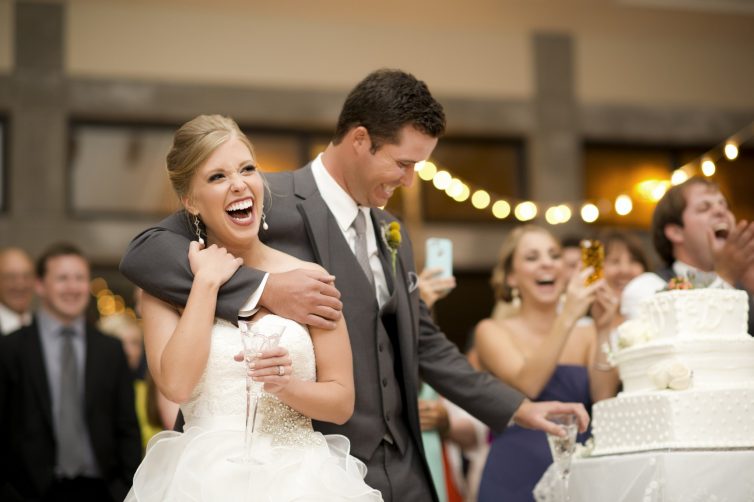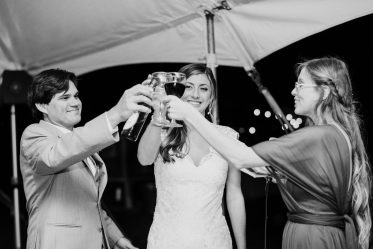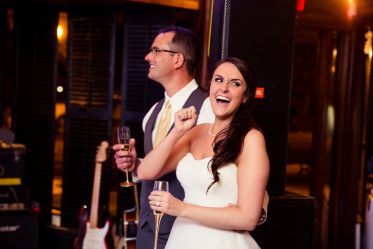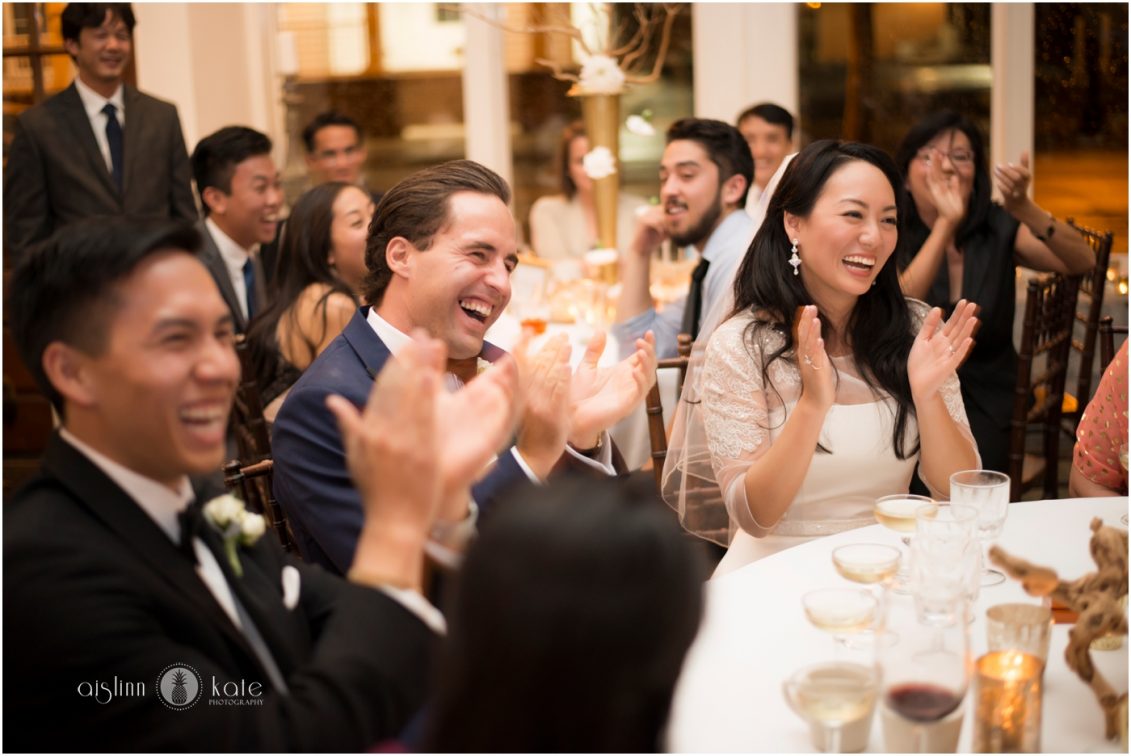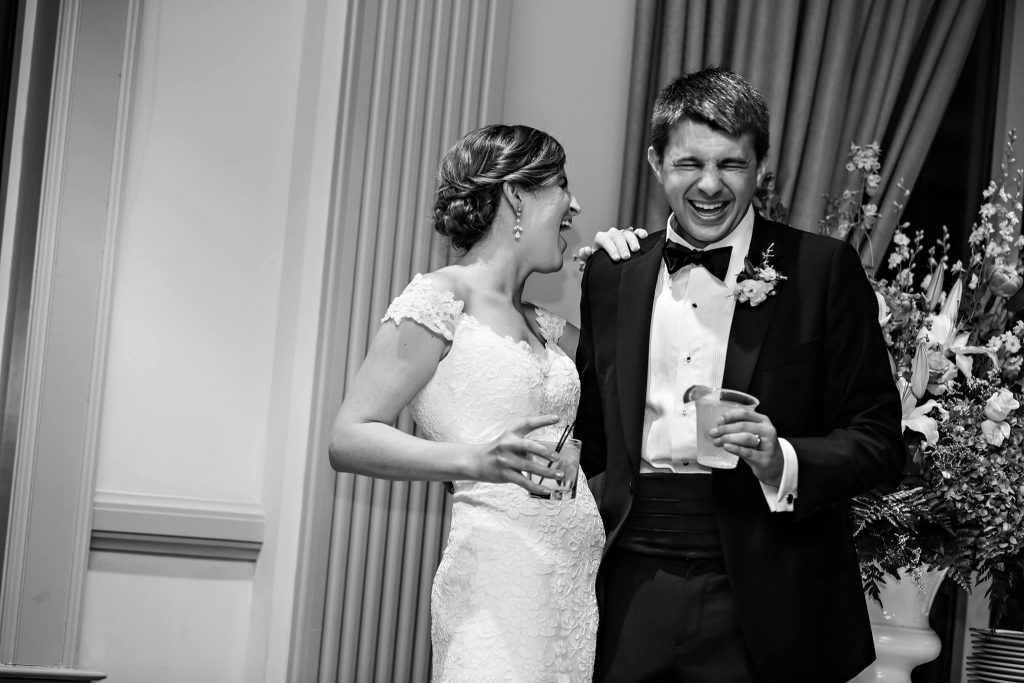
If you ask anyone to name a few traditions that occur at a wedding reception, the toast will always be among the first. Toasts are a special way to honor the bride and groom as the people who know them best get to put into words their thoughts and feelings for the new couple. These unique moments generally contain stories from the past, best wishes for the future, and meaningful words of advice. Here are some of our thoughts regarding common questions that you may have about the toast.
Who should toast?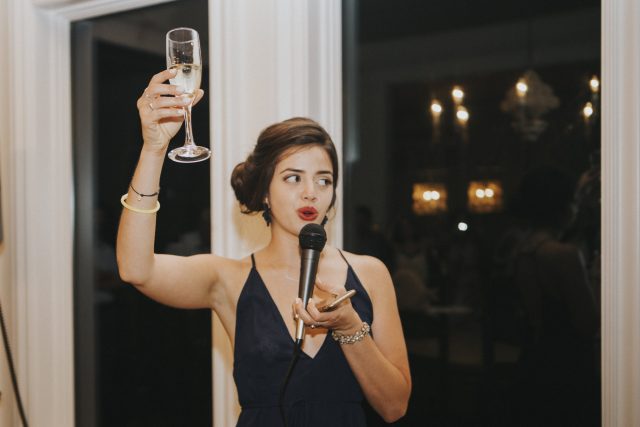
The three guests to traditionally offer up a toast are the Best Man, Maid (or Matron) of Honor, and the Father of the Bride. There are no set rules, however, on who must give a toast so don’t feel like those three must give one – or that anyone else isn’t permitted. You might have a best man who is deathly afraid of public speaking – don’t force him to do it if you know it will ruin his night; or maybe you have a very close uncle who has asked ahead of time to say a few words – that is no problem to add him to the list of intended speakers. Our main advice on this matter is to just know ahead of time who will be doing the toasts and, less importantly, in what order. Additionally, all guests toasting should know several days, if not weeks, ahead of time so that they have plenty of time to gather their thoughts. Your coordinator and emcee should also have this information which will make things run smoothly once you get to that point of the evening.
What time of the reception should the toasts occur?
All wedding timelines are a little bit different and there is no specific time that toasts must occur. However, like all of the other wedding traditions you may do that day, you want everything to flow as smoothly and seamlessly as possible. With this in mind, there are several times that the toast works the best. Our favorite time is to do it after dinner and before the cutting of the cake. When dinner starts, guests are generally either moving around a bit (with food stations) or all talking amongst themselves at their tables (with buffets or seated dinners). After dinner winds down and guests are full and happy, toasts are an easy way to get everyone’s attention and, once you have that attention, the segue into cake cutting is an easy one.
 Sometimes toasts are split up into two different portions of the evening. If you feel it is appropriate for the father of the bride (or other host of the event) to give a welcome, then this is generally done before dinner and often replaces a toast they might have done later (although not always). Either way, if additional toasts besides the welcome are to be given that evening, we usually recommend doing them later so that you don’t hold up the start of the reception.
Sometimes toasts are split up into two different portions of the evening. If you feel it is appropriate for the father of the bride (or other host of the event) to give a welcome, then this is generally done before dinner and often replaces a toast they might have done later (although not always). Either way, if additional toasts besides the welcome are to be given that evening, we usually recommend doing them later so that you don’t hold up the start of the reception.
Whatever time you choose for your toasts, just make sure that it is an easy time for everyone to pay attention (e.g. avoid doing it while there are guests in the buffet line) and that it flows well with the other events of the evening.
Should we open up the floor for other guests to toast?
We often recommend against opening up the floor for toasts during your reception. Sometimes this works out well but, more often than not, one of two situations invariably occur: either nobody gets up to toast and then it is extremely awkward, or dozens of people rise to the occasion and you spend the better part of an hour listening to speeches. The problem with the latter is that receptions are generally only four hours long and now you have taken up what could have been a very expensive hour of entertainment with a band or dj. One easy solution for couples who do want to open up the floor for toasts is to do so the night before at the rehearsal dinner. This allows your close family and friends that wish to speak the chance to do so but solves the problem of taking up too much reception time. Taking it a step further, some of our couples choose to do ALL the toasts the night before at the rehearsal dinner.
It ultimately comes down to what you feel works best for your reception!
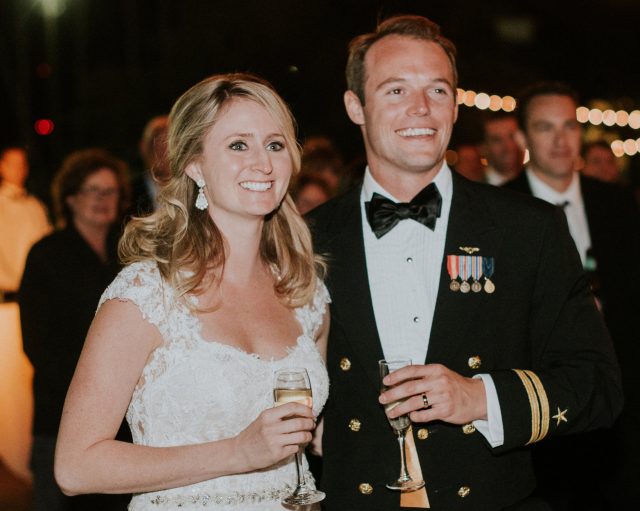 Should we pass champagne for the toast?
Should we pass champagne for the toast?
The answer usually depends on several factors: budget, bar options for guests, and style of dinner service.
Are you offering a host bar for your guests? If you are then it depends on how much disposable budget you have left and if you just prefer to toast with champagne. Some brides love the idea of champagne flutes being passed in preparation for the toast – if you do then by all means toast with champagne! However, if you don’t really care about champagne, and you are offering a full bar, then I usually recommend skipping the bubbly and just having the emcee allow guests time to refill their beverages. The reasoning for this is because we seem to dump out a lot of unconsumed champagne in situations that a full bar is also available. If I am a guest and I have my Jack & Coke, and you put a champagne flute in front of me, I will raise the glass like everyone else but probably just take a sip and then continue on with my drink of choice. Therefore you can save a little bit, and be less wasteful, by letting them toast with the drinks they already have. One potential caveat to this is if it is a more formal reception (such as a plated dinner) and it is just easier to bring champagne to everyone at their table instead of them getting up to refresh their glass.
If you are not paying for guests’ bar drinks, but still want to have a toast with alcohol, then we always recommend passing champagne if it fits in your budget. Guests at these events most likely do not have their drink of choice in front of them and therefore champagne is a special treat and ensures everyone has a glass to raise.
No matter what you decide for the guests, we generally pour a glass of champagne for the bride and groom unless they prefer to toast with something else.
Do we have to toast with alcohol?
Definitely not! There are plenty of weddings that do not offer alcohol to guests for one reason or another (such as religious, personal, or budgetary) and there is absolutely nothing wrong with that. There is certainly always non-alcoholic beverages available at these weddings and guests can raise their glasses all the same. Some of these couples choose to pass sparkling cider – or another type of non-alcoholic ‘champagne’. We have even passed fun things like root-beer floats or milk & cookies for the toast! In the end, the toast is about the TOAST – the words spoken to you and your guests by close friends and family. What everyone is drinking is, ultimately, irrelevant.
Do we even have to toast?
You do not have to do anything you don’t want to at your reception! Toasts are a tradition that most guests are used to seeing, but some couples choose to skip it entirely. Maybe you just want to dispense with anything formal or traditional at your wedding. Maybe your culture or religion doesn’t even have that as a tradition. Whatever the case, it is your wedding and you get to decide what you want to do (or allow guests to do) at your reception. The one exception to this would be if the person or couple footing the bill for the reception (usually the parents of the bride) wants to say a few words. Unless you are adamantly opposed to it, in which case you need to have that conversation months ahead of time, then decorum would dictate that they are able to do so.
Final Thoughts
There are many options for the way you handle the toasts at your wedding reception if you choose to do them. These have been our few suggestions based on our experience but every wedding is different and there is no cookie-cutter answer to any of these questions. Always get input from the professionals you have hired, but in the end do what you feel works best for your unique situation.
Cheers!

